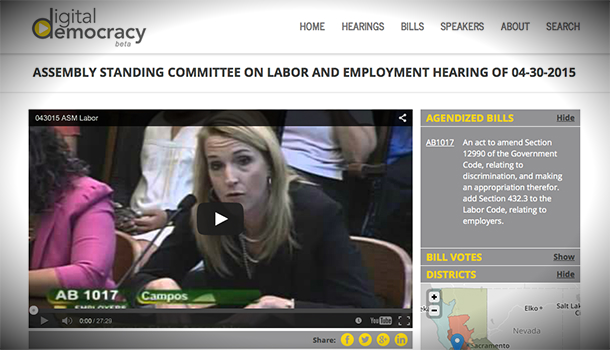Staying informed and engaged in the legislative process can be a full-time job. State lawmakers have introduced more than 3,000 new bills in the first few months of this legislative session. Proposals target a variety of issues, from bolstering local government transparency to boosting voter turnout among youth to expanding career technical education programs. A digital tool launched this week seeks to make it easier for Californians to keep an eye on what’s happening within the walls of the Capitol.
Lt. Gov. Gavin Newsom and former State Senator Sam Blakeslee unveiled Digital Democracy, a free, online platform that leverages cutting-edge technology to foster greater transparency and inclusiveness in the legislative process.
“Right now it is a very closed place, and the public is largely not able to see what happens, unless they are attending legislative committee hearings in person,” Blakeslee said. “The California Legislature does not produce transcripts or minutes from these hearings. There is no list of who was in the room, influencing decisions that were made.”
Developed by students at the Institute for Advanced Technology and Public Policy (IATPP) at California Polytechnic State University (Cal Poly), Digital Democracy is a “Google-like” search engine that allows users to search for, view, and share video clips of Assembly and Senate committee hearings. “Californians will be able to see exactly what people are saying as state laws are being written,” Blakeslee, IATPP’s founding director, explained.
Merging voice and facial recognition software with campaign contributions, conflict of interest data and legislators’ voting records, the platform not only enables users to identify key political players and influencers in the Capitol, it also reveals their connections to campaigns, interest groups and legislative actions.
“Technology has radically changed the way society interacts, but government is on the cutting edge of 1973. All of this only increases the gap between people and government,” said Newsom, a longtime champion of tech-driven transparency. “Digital Democracy gives citizens the keys to unlock Capitol corridors and assess facts in a way that they can be part of the process of governing again.”
This web-based tool gives advocates and community-based groups like Jim Roberts, founder of Family Care Network, a San Luis Obispo-based nonprofit that helps foster children, who can’t afford to hire lobbyists or maintain a permanent presence in the Capitol, the ability to monitor legislation on issues important to them without ever leaving their desks. Instead of driving five hours to sit in on a hearing, Roberts can now engage in the process with just a few clicks of the mouse, which he argues will make him a more effective advocate.
“Public trust increases when government transparency increases,” said CA Fwd’s Public Affairs Director Phillip Ung. “This project represents an important step toward rebuilding public trust by combatting the growing cynicism of the political process. Digital Democracy has the potential to turn a legislative committee hearing into viral clip on social media shared and commented on by newly engaged citizens. Simply put: it’s a game changer.”
Providing virtual access to the halls of the Legislature can empower the public to get involved in the decision-making process and equip voters with tools to hold leaders accountable. This effort demonstrates how technology-driven transparency can foster accountability, enhance efficiency and transform the relationship between government and the people it serves.
At a time when trust in government is low, encouraging public participation and inclusion helps strengthen confidence in the integrity and impartiality of the legislative process.


